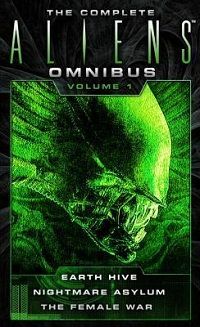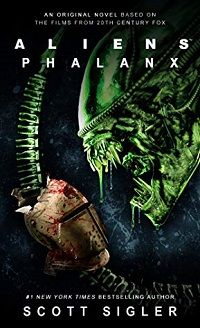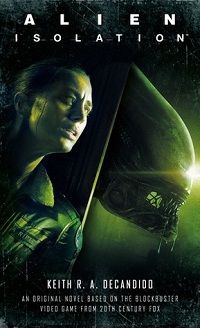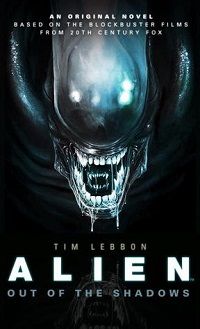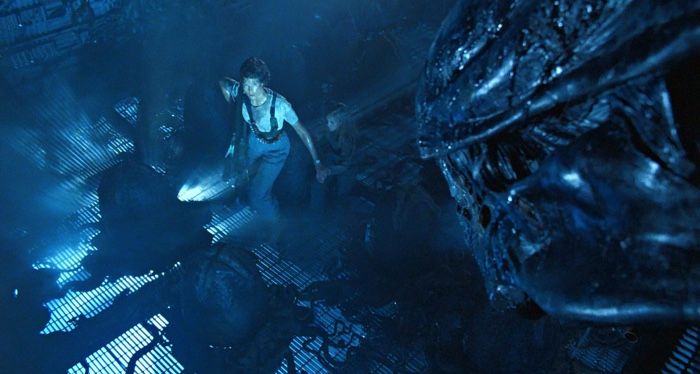
From Film to Fiction: Creating the Alien Franchise’s Literary Canon
I love the Alien franchise. Some people are Star Wars people, some are Star Trek people, me I’m an Alien girl. Something about that perfect mix of science fiction and screaming bloody terror—it just works for me. But with only so many hours of film to watch, like any good fan I’m always hungry for new content. And thankfully the Alien franchise has developed a significant literary canon to expand upon the film universe, so this Alien-hungry bookworm can keep on reading.
It make sense, really, that a franchise with such deep literary roots would make inroads into book publishing. Lovecraft, Conrad, Frankenstein, and of course the Prometheus mythos from which Frankenstein derives its own inspiration, have all informed the development of the series, from the original 1979 film to the most recent of Ridley Scott’s prequels. Lovecraft is in the foundations of the original film, in its scope and its vast, apathetic universe that does not care if we live, or die screaming in the depths of space. And it wasn’t until I had the chance to watch a recent documentary Memory, about the making of Alien, that I was introduced to the Conrad connection, and the influences of imperialism and colonization on the development of the film’s plot.
One of the reasons that the series has such longevity, one of the reasons it sticks with you, is that is has the same resonance as the works that have informed its creation. Alien has a mythic quality to it, built upon a framework of eternal themes and base human fears. Of course then, when it came time to expand the universe past the boundaries of the films, the franchise would make its way onto the printed page.
Familiar Worlds and New Horizons: A Brief History of the Alien Franchise Literary Canon
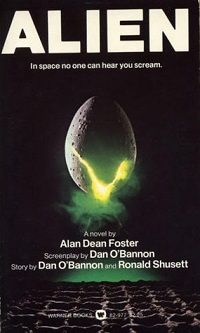
Since Foster’s early contributions, the Alien canon has jumped the rails of film novelization and gone original. New stories, new characters and a few old favorites, new worlds, same old xenomorphs. In late 1992, after the release of Alien 3, Bantam books teamed up with author Steve Perry and started releasing new Alien novels, set in the same universe as the films but only tangentially related to them and referred to by the name of the second film, Aliens. This would eventual evolve into the first of three novel series, and involve several other talented authors, but it began with Perry’s Aliens: Hive Earth. The first in a trilogy of novels, Aliens: Hive Earth introduced readers to Wilks and Billie, a battered, disenchanted ex-Colonial Marine and a young girl, the last survivor of a colony devastated by xenomorphs. Perry wrote the first two novels, Aliens: Hive Earth and Aliens: Nightmare Asylum solo, and co-authored the third book, Aliens: The Female War with daughter S.D. Perry.
These three books kicked off what ended up being a nine book run of novels from 1992 to 1998, five of which, excitingly enough, were written or co-authored by women, for whom a franchise with such a legendary female lead must have held a particular appeal. The second series of novels from 2005 to 2008 contained six books, and both novel series, most now out of print in their original format, have been combined into seven omnibuses—The Complete Alien Omnibuses 1–7—by Titan Books in the last few years, giving new readers a chance to revisit these older Aliens adventures and nightmares.
My introduction to the Alien franchise’s literary canon started with the third and most recent series of Alien novels. Specifically, Tim Lebbon’s excellent Alien: Out of the Shadows. I listened to the dramatized audiobook version before picking up a hard copy to read, and trust me the first time you hear a xeno hiss in your ear you will walk faster. Alien: Out of the Shadows is heart pounding. It also reunited me with my first love, Ripley, as Out of the Shadows and the two subsequent books, Alien: Sea of Sorrows (James A. Moore) and Alien: River of Pain (Christopher Golden), are interquels. All three books take place in the 53 year window between Ripley’s sign off at the end of Alien, and her awakening and return to LV-426 in Aliens. Ripley makes appearances in books one and three, and book two features a slew of vengeful xenomorphs and one of Ripley’s own descendants.
And that’s just the beginning! Because the ongoing third series of novels is already eight books long. With more planned for the future—courtesy of Titan Books’s loving cultivation of the Alien franchise—this series is set to overtake the first, ushering in a new wave of talented authors and new innovations on the canon. The later novels in the third series take place after Aliens, offering a secondary world view to that of the film canon and reintroducing readers to, among other things, the evil machinations of the omnipresent Weyland-Yutani Corporation.
Alex White’s Alien: The Cold Forge and Tim Waggoner’s Alien: Prototype both deal with corporate espionage as Weyland-Yutani and its rivals vie for control of their most dangerous asset. Waggoner’s novel also introduces readers to former Colonial Marine (and general badass) Zula Hendricks, tying the novel canon into Brian Wood and Robert Carey’s gorgeous Aliens comic run with Dark Horse (Aliens: Defiance). As does Keith R.A. DeCandido’s Alien: Isolation, which novelizes popular video game and the harrowing ordeal of Ripley’s daughter Amanda on the crumbling Sevastopol Station. Amanda Ripley meets up with Zula Hendricks in Wood/Carey’s Aliens: Resistance, following the events of Alien: Isolation.
Titan Books’s most recent release (which they were kind enough to send me before it came out on February 25, thus not leaving me to languish in a desert of fandom deprivation—and no they’re not paying me, I just really like their work and that they feed my obsession), Scott Sigler’s Aliens: Phalanx, is something entirely new: a spears and shields novel set in the Alien universe. A planet with a lost past and a people on the verge of extinction, besieged by vicious “demons” from the belly of a dormant volcano. In a lot of ways Aliens: Phalanx gave the impression a crossover novel between the usual hard sci-fi of Alien and something from a fantasy novel, and the epic battles between the spear wielding natives and the “demons” gives a the familiar conflict between humans and xenomorphs the feeling of something eternal. Something mythic.
Creating the Canon: A Q&A with Tim Lebbon, Scott Sigler, and Keith R.A. DeCandido
Recently I had the opportunity to do something really cool: I was able to create questions about what it was like to write for the Alien franchise and send them to three of the authors who have recently contributed to Titan Books’s newest series of Alien novels. Tim Lebbon (Alien: Out of the Shadows), Scott Sigler (Aliens: Phalanx), and Keith R.A. Decandido (Alien: Isolation) were kind enough to send me some answers!
I was particularly interested in what the experience of creating within an extant canon was like, given that the Alien Universe is literally as vast as space itself. What is more, within this vast universe have already seen a number of innovative approaches to this overarching story of man vs. xenomorph, from the “monster in the house” narrative of the original to the military based adventures of the colonial marines or the invasion stories of distant colonies over run by the alien menace. So how do you create in a space that is simultaneously so limitless and limited?
Tim Lebbon had two different experiences as an Alien author. His first alien novel, Out of the Shadows, involved getting to work within the main story line of the franchise, and even to write a story Ripley herself, and involved “timeline problems to overcome, and people and characters [he] could or couldn’t kill.” But he also describes there being “quite a bit of freedom with the details of the story” and the opportunity to create new, original characters as well. In his second alien novel (trilogy of novels, actually, the Rage War trilogy), however, Lebbon describes a much greater degree of freedom and the opportunity to “imagine a whole area of the galaxy that had been explored and populated by humanity. [Its] scope was huge, and whilst featuring these two iconic creatures, it was also a space where [he] was allowed to develop their mythologies, and try to create an expanded world and story of [his] own.” In probably one of my favorite anecdotes from this series of interviews, he wrote about how the cast of the Rage Wars trilogy was so huge that he had to ask his Facebook followers if they wanted to be “horribly killed by xenos or predators in vast space battles. Naturally, they did.”
Scott Sigler had some experience with the challenges of writing for the franchise before he started Phalanx, because his story “Dangerous Prey” had been part of Jonathan Maberry’s anthology Aliens: Bug Hunt. He describes the biggest challenges of writing Phalanx (which is an absolute brick of a book by the way, but you won’t even notice the length once you get going!) as being the ones he created for himself, for instance by keeping the xenomorphs but removing the other great villain for the Alien franchise: the omnipresent Weyland-Yutani: “Without the persistent “Big Bad” of WY (who is the true villain in almost all Alien stories) to drive the lying/manipulating/betraying plot angles, I forced myself to develop a structure that felt realistic yet still delivered some of the key elements that are inherent in a xenomorph tale.” He also mentioned the difficulty of injecting new terror into a monster that people have seen many times now on the big screen and that has become something of a cultural icon. As he points out, “even fans of mine that have never seen an Alien franchise movie know what a xenomorph looks like.”
So if you get the chance to navigate the joys and sorrows of writing for a canon, how do you decide what story to tell? Who will your cast and lead characters be? Marines or Biologists? Colonists or Corporate Spies? Where will they be? Is it a clunking old ship on its last legs, a mining colony, or some lush distant planet full of exotic flora and fauna?
For Sigler, finding his story was a process. He worked with Titan Books editor Steve Saffel on a number of different potential plots and story ideas, “ranging from cool heist stories to mercenary capers to tales of xenomorph evolution that strictly obey known biological practices.” They finally settled on what would become Phalanx because the formula of spears and shields in space, and the innovative design of his setting, the far off Ataegina with its ancient-esque society, “really stood out as something unique in the Alien universe”.
For DeCandido, on the other hand, there was no selection process—his story was chosen for him. Fox wanted a novelization of the Alien: Isolation video game and he was approached by Titan Books for the project. It’s an interesting counterpoint to Sigler’s selection process because it highlights how, when creating for an existing canon, there are stories that can be told, and stories that need to be told, and a balance that has to be struck between creators and parent companies. But while plot design was out of DeCandido’s hands, he points out that the appeal of taking on the Alien: Isolation novelization was in part due to getting to write Amanda Ripley, who he describes as “a fascinating and complex character” who is as much her own person as she is the daughter of the legendary Ellen Ripley: “I’ve always been interested in consequences to actions, and what the ripple effects are of the big events that we tend to see, and what happens to those left behind or abandoned or whatever. We know what the consequences were to Ripley for not being found for decades between the first two movies, but in Isolation I got to focus on what the consequences were for those people she left behind, which was very appealing to me as a writer.”
Aside from the joys and challenges of writing within an existing canon, and how to find the story you want to tell, I also wanted to know, with so many stories already being told, were there prior works in the franchise that particularly inspired you? And because your work cannot exist in a vacuum, separate from the rest of the canon, how do your works then come to be in conversations with all the novels that have come before you? Obviously Lebbon, Sigler, and DeCandido are all Alien fans from way back, influenced by the films that made such strong first impressions. All three agreed that Alien, Aliens, or both were their favorite films of the franchise (not surprising given how many fans feel about the later films, she says sliding her beloved copies of Alien 3, Alien: Resurrection, and the prequels under the couch), acknowledging the influence of Aliens‘s action-adventure storyline, and what Keith DeCandido referred to as Alien‘s “portrayal of Space Longshoremen on a battered, broken-down old ship, which provided the template for this rather dank future,” which set the stage for everything that followed.
For Lebbon, his novel Out of the Shadows is influenced most by Alien, “with its claustrophobic atmosphere, establishment of a strong set of characters (some of whom we know from the off won’t survive that next shadowy corner or stairwell)” but he describes the Rage War trilogy as being “as much a trilogy about the Colonial Marines as it is about the xenomorphs and predators” and more of a tribute to Aliens militaristic action-adventure future. And Sigler considers his new novel Phalanx to be a “logical extension of Alien and Aliens” with a particular admiration for the “the well-defined and highly plausible biological life cycle” of the film Xenomorphs: “While Phalanx doesn’t run counter to the information presented in Alien III, Resurrection, Prometheus and Covenant, if fans of the first two films disagreed with the biology and storylines of the last four then those fans will likely groove on [Sigler’s] novel.”
The last thing I wanted to know, with all the serious questions out of the way, was what hadn’t I covered? What was the fun, or strange, or fascinating aspect of writing for the Alien Canon that we hadn’t covered?
For Lebbon it was the research. He mentioned specifically all the research he put into space travel when writing the Rage War trilogy, and his quest for realism in futuristic transportation: “I wanted to come up with something that was at least vaguely realistic. So there’s no skipping to the other side of the galaxy in just a few minutes. Space travel takes time, and I came up with a neat network of transport hubs that enable the characters to jump between different points within the expanding sphere of the explored portion of the galaxy. Of course, any story like this set in deep space—Star Wars, Trek, etc—is going to play games with science, and that’s pretty essential to serve the story. But it was a fun bit of research to do.”
Sigler’s favorite part of his research was working with his many consultants to “bring in real-world concepts that help ground the story and make it believable.” For him, author Myke Cole’s nonfiction Legion vs. Phalanx was an integral text in bringing “an original yet believable culture that emulates Summerian, Greek, Swiss and Scottish military strategies.” He worked with Dr. Joseph Albietz III, MD, on human/xenomorph biological interaction, with fellow Alien Franchise author Alex White on a “logical scientific build-out of the xenomorph form”, and with Alien franchise experts Scott Middlebrook and Clara Fei-Fei Čarija to ensure that Phalanx was integrated into the existing Alien canon.
DeCandido was grateful for the chance to explore the character of Ellen Ripley through her daughter, “Through flashbacks to Amanda’s childhood, as well as Amanda’s own reading of some old reports from one of Ellen’s pre-Nostromo gigs” which enabled him to dig deeper into the back story of “one of science fiction’s most compelling characters […] getting to write her and flesh her out was a great honor and tremendous fun.”
The Future of the Alien Canon
I could not be more excited about where the Alien franchise is going (and, of course, about the possibility of new content). In fact, my only disappointment thus far with this new series of Alien novels is that we’ve gone from five in nine books authored or at least co-authored by women, to zero in eight.
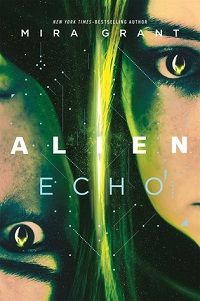
Yes, the future of Alien franchise novels looks as bright as a set of silver teeth in a dark corridor. If you need me I’ll be making space on my bookshelves.



